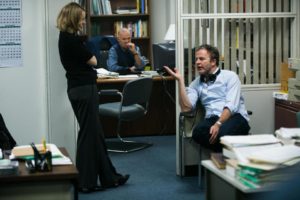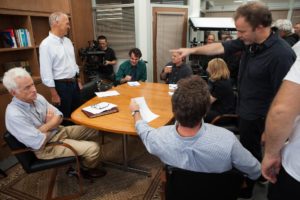Originally published in the Boston Globe on October 30, 2015 By Meredith Goldstein.

From left: Rachel McAdams, Michael Keaton, and director Tom McCarthy on the “Spotlight” set.
On Jan. 6, 2002, The Boston Globe published a story by its investigative Spotlight team revealing that the Catholic Church knew about sexual abuse in its ranks and allowed a priest — John J. Geoghan — to keep his job, even though he had abused young parishioners for years.
It was the first story in a series that dug deep into the Catholic Church sexual abuse scandal. The initial piece, which shocked the Boston community, asked: “Why did it take a succession of three cardinals and many bishops 34 years to place children out of Geoghan’s reach?”
It was a question that sparked the interest of film producers Nicole Rocklin and Blye Faust, who were attracted to real-life stories. A writer had suggested that the pair look into the story, and as soon as they did, they knew they wanted to make a film, not about the scandal itself, but about the journalists who told the story.
“It was immediate. It was obvious from the get-go,” Faust said, of their interest in producing a movie.
In 2009, Rocklin and Faust began optioning the life rights of those involved in the story — specifically Spotlight reporters and editors Walter Robinson, Michael Rezendes, Sacha Pfeiffer, Ben Bradlee Jr., Matt Carroll, and Marty Baron, who had just taken over as editor of the Globe when he suggested that the investigative team look into the Catholic Church.
From there, they looked for a director and writer. They sent the project to production and management company Anonymous Content (”The Revenant,” “Mr. Robot,” “The End of the Tour”), to look for writing and directing clients, and execs Michael Sugar and Steve Golin felt so strongly about the idea that they signed up to help produce. By 2011, the team had attached Boston College grad Tom McCarthy, of “Win Win” and “The Station Agent,” as director and Harvard Law grad Josh Singer, of “The West Wing” and “The Fifth Estate,” as writer.
That’s when the story evolved. While there were hundreds of articles and several books (including one by the Spotlight team) about the Catholic Church scandal, there was no book that told the tale of how the reporters got the story. Singer and McCarthy — who eventually signed on as co-writer — began conducting dozens of interviews with the reporters, their editors, and anyone who was affiliated with the coverage.
“Very quickly, we were coming to Boston, and coming to Boston, and coming to Boston,” Singer remembered. “And when I said, ‘OK. We’re done. We’ve talked to enough reporters.’ [Tom’s] like, ‘No, no, no. We gotta go back.’ ”
Through their research and interviews, it became clear that the story wasn’t just about reporters who unearthed a scandal. Rather, it was about an entire community that became complicit — from law enforcement to parents of victims to the newspaper itself. The question was no longer why it took 34 years to remove Geoghan from his post. It was: Why did so many people — including The Boston Globe, which covered these abuse cases piecemeal — not notice the greater trend and question how much the Catholic Church knew about the systemic problem?
The result of McCarthy and Singer’s work is that all institutions are held accountable in “Spotlight,” which opens Friday in Boston, New York, and Los Angeles. Globe editors and writers portrayed in the film — many of whom grew up Catholic — must ask themselves why they didn’t notice what was happening around them for decades. All are given the opportunity to redeem themselves.
“Very early in our research and just talking to people in our interviews, we started to circle this idea a little bit. And then as that research and interviews continued, it started to solidify for us. And in a way, maybe thematically, it elevated the material to something a bit more universal, which is societal complicity and how tricky that can be,” McCarthy said. “Part of the occupational hazard of being a reporter is, you just miss things. Things fall through the cracks. A lot of things are coming at you and you make judgment calls. Sometimes you’re right, sometimes you’re wrong.”
Ruffalo, who plays Rezendes in the film and shadowed him in the Globe newsroom to prepare for the role, said the themes are what made the script so special. He said the story gets to the heart of a “slow-motion atrocity,” and shows how locals addressed the truth once it was brought to light.
The cast on the set of “Spotlight.”
The cast on the set of “Spotlight.”
“It was surprising that this scandal was so far reaching into so many different institutions in Boston. To have continued for as long as it had, there had to be a lot of people looking the other way,” Ruffalo said, adding, of the reporters and editors who took on the story, “It’s also really beautiful that an institution can correct itself — that these men and women did just that, and they had to do a lot of soul searching to do that.”
The story has resonated with audiences far beyond Boston. After receiving praise at the Venice Film Festival, McCarthy and Singer brought “Spotlight” to the Toronto International Film Festival, where the drama got plenty of love from critics. Vanity Fair’s Richard Lawson wrote, “ ‘Spotlight’ has swiftly emerged as an Oscar favorite, if not the Oscar favorite, at the festival.” The real Globe reporters and editors joined the actors at that premiere, and received a standing ovation from the crowd as they took the stage. The journalists all advised their actor counterparts throughout the shoot; Baron is played by Liev Schreiber (“Ray Donovan”), Robinson by Michael Keaton, Pfeiffer by Rachel McAdams, Bradlee Jr. by John Slattery, and Carroll by Brian d’Arcy James.
The real Baron told a Toronto crowd after the festival’s public premiere that he hopes the film will highlight the importance of investigative and local journalism.
Ruffalo said that is just what it does.
“I think it’s a shining moment for the work that [journalists] do and the importance of the work and how that work is done,” Ruffalo said. “Warts and all.”







